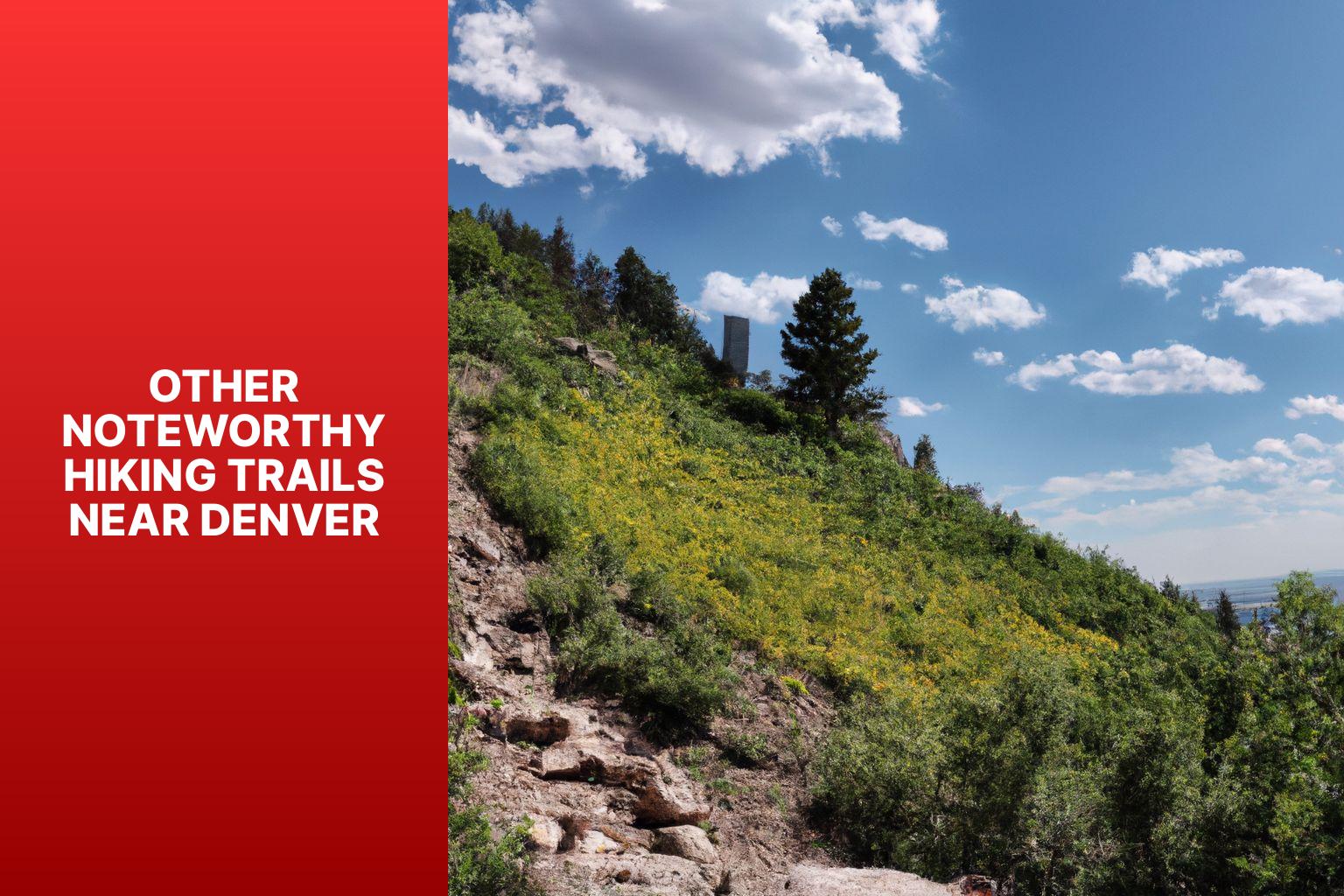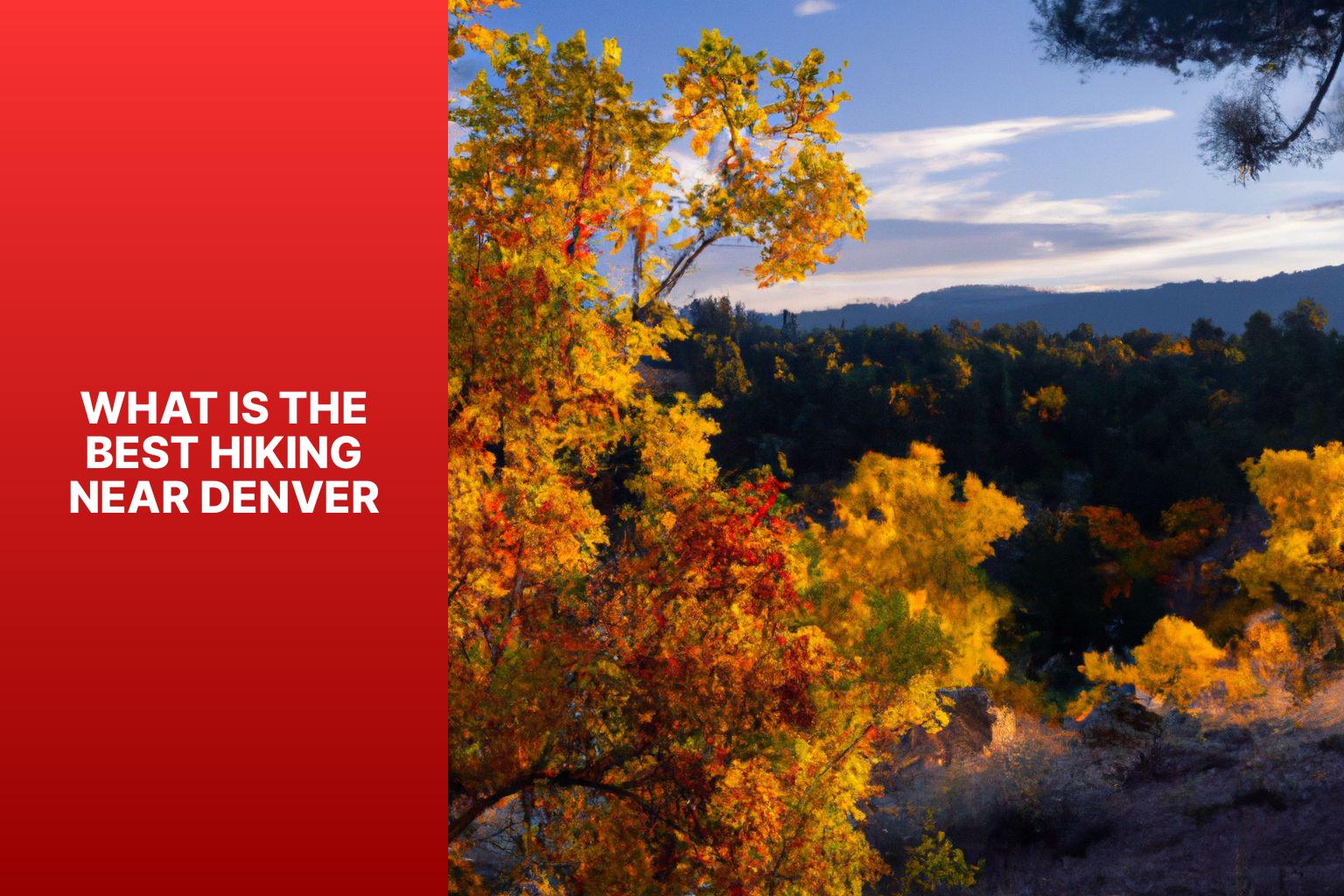What is the Best Hiking Near Denver?
Denver, Colorado, offers a plethora of breathtaking hiking trails that are perfect for outdoor enthusiasts. Whether you’re seeking panoramic mountain views, alpine lakes, or challenging terrains, Denver has it all. Here are some of the best Fall hikes in Colorado that are worth exploring.
| Rocky Mountain National Park: A Hiker’s Paradise |
| 1. The Longs Peak Trail: Known for its stunning vistas and challenging ascent, this trail offers a rewarding experience for seasoned hikers. |
| 2. The Bear Lake Loop: This family-friendly trail showcases the beauty of Bear Lake and its surrounding scenery. |
| 3. The Emerald Lake Trail: A picturesque trail that leads to several stunning lakes, including Nymph Lake, Dream Lake, and the gorgeous Emerald Lake. |
Mt. Evans: A Scenic and Challenging Hiking Destination
| 1. The Mount Evans Summit: This trail takes you to the summit of Mount Evans, one of Colorado’s famous “Fourteeners,” providing breathtaking panoramic views. |
| 2. The Chicago Lakes: This trail offers a scenic hike to two pristine alpine lakes with stunning mountain views along the way. |
| 3. The Abyss Lake: A challenging hike that leads to the secluded Abyss Lake, surrounded by towering peaks and high alpine meadows. |
The Indian Peaks Wilderness: Stunning Alpine Beauty
| 1. The Diamond Lake Trail: This trail leads to Diamond Lake, nestled amidst a stunning alpine landscape with wildflowers and cascading streams. |
| 2. The Isabelle Glacier Trail: Known for its stunning wildflowers and a chance to glimpse the impressive Isabelle Glacier. |
| 3. The Pawnee Pass Trail: This trail takes you through breathtaking meadows, past shimmering lakes, and eventually reaches the stunning Pawnee Pass. |
Other Noteworthy Hiking Trails Near Denver
| 1. The Lookout Mountain Trail: A popular trail with beautiful views of the city, showcasing the iconic natural beauty of Colorado. |
| 2. The Mount Falcon Trail: Offering a mix of challenging terrain and historical ruins, this trail rewards hikers with panoramic views of the surrounding area. |
| 3. The Lost Creek Wilderness Loop: A remote and lesser-known trail that winds through unusual rock formations, meadows, and scenic forests. |
With these incredible hiking trails near Denver, outdoor enthusiasts can experience the best of Colorado’s natural beauty and embark on memorable adventures amidst stunning landscapes.
1. The hiking trails near Denver offer diverse options for outdoor enthusiasts, allowing them to explore different terrains and landscapes. 2. Rocky Mountain National Park is a must-visit destination for hikers, with trails like the Longs Peak Trail, Bear Lake Loop, and Emerald Lake Trail offering stunning scenery and a variety of experiences. 3. Mt. Evans provides hikers with both scenic views and challenging trails, such as the Mount Evans Summit, Chicago Lakes, and Abyss Lake trails, making it a great choice for adventurous hikers seeking a thrilling experience.
Rocky Mountain National Park: A Hiker’s Paradise
Discover the breathtaking beauty and endless possibilities for adventure in Rocky Mountain National Park, a true hiker’s paradise. From the challenging Longs Peak Trail to the scenic Bear Lake Loop and the enchanting Emerald Lake Trail, each sub-section of this section will take you on a thrilling journey through some of the best hiking trails near Denver. So lace up your boots, grab your backpack, and prepare to be immersed in the unrivaled wonders of Rocky Mountain National Park.
Trail 1: The Longs Peak Trail
When hiking near Denver, The Longs Peak Trail is a must-visit trail. To make the most of your experience on The Longs Peak Trail, follow these steps:
1. Prepare physically and mentally: The Longs Peak Trail is a strenuous trail reaching an elevation of 14,259 feet. Ensure you are in good physical condition and acclimate to the altitude beforehand.
2. Check the weather conditions: Weather can change rapidly on The Longs Peak Trail, so check the forecast before starting your hike. Dress in layers and pack rain gear for unexpected changes.
3. Start early: Begin your hike on The Longs Peak Trail in the morning to avoid thunderstorms and crowds. You’ll have enough time for the approximately 15-mile round trip.
4. Stay hydrated and fueled: Carry plenty of water and energizing snacks for The Longs Peak Trail hike. Don’t forget a packed lunch to keep your energy levels up.
5. Follow the trail markers: The Longs Peak Trail is well-marked, but pay attention to the signs and stay on the designated trail. Straying can be dangerous.
6. Take breaks and pace yourself: The Longs Peak Trail is a challenging trail that requires breaks. Listen to your body and enjoy the scenic views.
Trail 2: The Bear Lake Loop
The Bear Lake Loop is a scenic hiking trail in Rocky Mountain National Park near Denver, Colorado. Trail 2: It is suitable for hikers of all skill levels, making it a great option for families and beginners.
The loop is approximately 0.6 miles long and offers stunning views of Bear Lake and the surrounding alpine scenery. The trail is well-marked and easy to navigate.
Hikers can expect to see wildflowers and wildlife along the way, including birds, chipmunks, and possibly even elk or moose.
The trail is busiest in the summer, so it’s best to arrive early to secure parking and avoid crowds. During winter, the Bear Lake Loop is popular for snowshoeing and cross-country skiing.
Remember to bring comfortable shoes, water, snacks, sunscreen, and a map or GPS device.
If you’re looking for a picturesque and beginner-friendly hike near Denver, the Bear Lake Loop is a fantastic choice. It offers a delightful outdoor experience for everyone to enjoy.
Trail 3: The Emerald Lake Trail
The Emerald Lake Trail near Denver, Colorado offers stunning scenic beauty. Hikers will be mesmerized by the breathtaking views of the surrounding mountain peaks and lush greenery, as well as the crystal-clear emerald waters of the lake. This trail, known as the Emerald Lake Trail, is of moderate difficulty and suitable for hikers of various skill levels. It includes some uphill sections but is well-maintained and accessible to most people.
The Emerald Lake Trail is approximately 3.6 miles long roundtrip, making it a great option for those looking for a moderately challenging hike. With an elevation gain of about 650 feet, hikers can expect to experience changing terrains and diverse landscapes. On average, it takes hikers around 2-3 hours to complete the Oregon fall hikes.
Along the trail, there are ample opportunities for wildlife spotting, including elk, mule deer, and various bird species. You’ll journey through dense forests, open meadows, and rocky terrain, all while crossing picturesque bridges and encountering stunning waterfalls.
To ensure a safe and enjoyable hike on the Emerald Lake Trail, it is recommended to come prepared. Make sure to pack plenty of water, snacks, sunscreen, and appropriate gear. Staying on the marked trail is crucial not only for your safety but also for the preservation of the environment. So lace up your hiking boots and embark on a memorable adventure on the scenic Emerald Lake Trail.
Mt. Evans: A Scenic and Challenging Hiking Destination
Looking for a hiking adventure near Denver that offers both breathtaking scenery and a challenging terrain? Look no further than Mt. Evans. This majestic peak is not only a hiker’s paradise but also a gateway to a myriad of stunning trails. In this section, we’ll explore three incredible trails: the Mount Evans Summit, the Chicago Lakes, and the Abyss Lake. Each trail promises unique experiences, making Mt. Evans a must-visit destination for avid hikers. Lace up your boots and get ready to embark on an unforgettable journey through nature’s wonders.
Trail 1: The Mount Evans Summit
The Mount Evans Summit trail is a challenging and breathtaking experience for hikers in Denver. Starting at Echo Lake, this trail takes you all the way up to the summit of Mount Evans, which stands at an impressive altitude of 14,265 feet.
When hiking the Mount Evans Summit trail, it is important to be physically fit and prepared for the high altitude conditions. This trail is approximately 3.5 miles in length and involves a significant gain in elevation of 1,500 feet. It is crucial for hikers to be aware of the potential risks associated with high elevations, such as altitude sickness, and take the necessary measures to acclimate themselves accordingly.
The views along the Mount Evans Summit trail are nothing short of spectacular. As you ascend, you will be treated to breathtaking sights of the picturesque landscape, including snow-capped peaks, alpine meadows, and serene lakes. One of the highlights of this trail is the panoramic vistas it offers of the majestic Rocky Mountains.
It is worth noting that the weather on Mount Evans can be unpredictable, with sudden changes in temperature and the possibility of thunderstorms. Therefore, it is essential for hikers to check the weather forecast before embarking on the trail and come prepared with the appropriate gear. This includes wearing layers to adapt to different temperatures, bringing rain gear to combat unexpected showers, applying sunscreen to protect from the sun’s rays, and carrying an ample supply of water to stay hydrated throughout the journey.
Trail 2: The Chicago Lakes
The Trail 2: The Chicago Lakes is a stunning hiking experience near Denver, Colorado. Follow these steps to explore the trail:
– Start at the Echo Lake Trailhead, which offers ample parking and restroom facilities.
– Follow the well-marked trail through a peaceful forest, enjoying picturesque views along the way.
– After about 2 miles, reach the Lower Chicago Lake and admire its crystal-clear waters.
– Continue on the trail, which gradually ascends to the upper lake. Remember to wear appropriate footwear.
– Enjoy panoramic views of the surrounding mountains and alpine meadows as you hike.
– Arrive at the Upper Chicago Lake, a pristine alpine lake nestled amidst towering peaks. Take a break, have a picnic, and soak in the serenity.
– Retrace your steps to return to the trailhead, appreciating the tranquility and beauty once more.
True story: While hiking the Chicago Lakes trail, I was amazed by the serenity of nature and the stunning vistas. The hike challenged me physically, but reaching the Upper Chicago Lake was worth it. As I gazed at the shimmering waters and majestic mountains, I felt a deep sense of peace and connection with the natural world. It was an unforgettable experience that showcased Colorado’s beauty and grandeur. Whether you’re a seasoned hiker or a beginner, the Chicago Lakes trail is a must-visit for anyone seeking a breathtaking outdoor adventure.
Trail 3: The Abyss Lake
– Begin your trek at the Abyss Lake Trailhead in the Mount Evans Wilderness area near Denver, Colorado. This scenic trail covers a distance of 8 miles and offers a moderate level of difficulty, with an impressive elevation gain of 2,500 feet.
– Follow the marked path as it winds through a dense forest adorned with majestic pine and aspen trees. The enchanting surroundings provide a breathtaking backdrop as you venture higher in altitude, showcasing stunning views of the neighboring Colorado winter hikes.
– Keep an eye out for the plethora of wildlife that may cross your path, including delightful creatures like marmots, deer, and elk. The trail also boasts rocky sections and steep ascents, providing an exhilarating challenge as you make your way to the captivating Abyss Lake in its serene alpine setting.
– Take a moment to fully immerse yourself in the awe-inspiring beauty of the lake, nestled amidst towering peaks and untouched wilderness. It is advised to pack an ample supply of water, snacks, sunscreen, as well as suitable footwear and clothing to ensure a comfortable and safe adventure.
– Embrace the principles of Leave No Trace and exhibit utmost respect for the natural environment throughout your journey. To elevate your experience at Abyss Lake, consider embarking on your hike early in the morning. This strategic approach not only allows you to avoid crowds but also enhances your chances of spotting wildlife and indulging in the tranquility of the lake and its surroundings.
The Indian Peaks Wilderness: Stunning Alpine Beauty

Photo Credits: Jasonexplorer.Com by Jordan Moore
The Indian Peaks Wilderness, nestled near Denver, is a haven of breathtaking alpine beauty. Get ready to be captivated as we explore three remarkable trails in this section. Trail 1 takes us on the mesmerizing Diamond Lake Trail, while Trail 2 leads us to the awe-inspiring Isabelle Glacier Trail. And finally, prepare to be enthralled by Trail 3, the challenging Pawnee Pass Trail. Lace up your boots and join us on this thrilling adventure through the stunning Indian Peaks Wilderness.
Trail 1: The Diamond Lake Trail
Trail 1: The Diamond Lake Trail in Denver, Colorado offers stunning alpine beauty and a rewarding experience for nature enthusiasts.
– Start at the trailhead accessed by following the signs and parking in the designated area.
– Marvel at the picturesque surroundings as you hike through the forests and meadows.
– Enjoy the peacefulness and serenity of the trail as you hike alongside a babbling creek.
– Be prepared for moderate difficulty with steep sections and rocky terrain. Wear proper hiking shoes and carry sufficient water.
– Take in the panoramic views of the mountains and valleys as you reach Diamond Lake, a beautiful alpine lake nestled among the peaks.
– Rest and rejuvenate at the lake, savoring nature’s beauty.
– Pack out any trash, leaving no trace to preserve the trail’s condition.
– Connect with nature and appreciate the awe-inspiring landscapes near Denver on this memorable hiking experience.
The Diamond Lake Trail is named after the diamond-shaped reflections created by sunlight on the lake’s surface, adding to the trail’s allure and mystique.
Trail 2: The Isabelle Glacier Trail
The Isabelle Glacier Trail is a notable hiking trail near Denver, Colorado. Here are some key points to consider when hiking this trail:
1. Location: The Isabelle Glacier Trail is in the Indian Peaks Wilderness, with stunning alpine beauty and captivating landscapes.
2. Difficulty Level: This trail is moderate to challenging, suitable for experienced hikers or those seeking a more adventurous hike. It requires physical stamina and proper hiking gear.
3. Trail Length: The Isabelle Glacier Trail is approximately 10 miles roundtrip, providing an immersive hiking experience.
4. Highlights: Along the trail, hikers can enjoy views of Isabelle Glacier and Lake Isabelle. The glacier is a dazzling sight, showcasing nature’s beauty. The crystal-clear lake is a great spot for a rest or picnic.
5. Flora and Fauna: As you hike, take in the diverse flora and fauna of the Indian Peaks Wilderness. Look for alpine wildflowers, spruce trees, and possible wildlife sightings like marmots and mountain goats.
6. Safety Precautions: It’s vital to be prepared before hiking the Isabelle Glacier Trail. Check weather conditions, carry plenty of water, and be cautious of loose rocks or uneven terrain. Inform someone of your hiking plans and estimated return time.
If you’re an avid hiker seeking a challenging adventure in breathtaking natural beauty, the Isabelle Glacier Trail is an excellent choice. Enjoy the majestic views, immerse yourself in nature, and create unforgettable memories on this remarkable trail.
Trail 3: The Pawnee Pass Trail
The Pawnee Pass Trail in Colorado is a stunning and challenging hiking trail near Denver. It offers breathtaking alpine beauty and is perfect for avid hikers seeking a rewarding adventure.
Hiking the Pawnee Pass Trail requires good physical fitness and proper gear. The trail covers approximately 9 miles and has an elevation gain of over 2,000 feet. It starts at the Long Lake Trailhead in the Indian Peaks Wilderness.
Along the trail, hikers will encounter diverse landscapes, including forests, meadows, and rocky terrain. The trail provides mesmerizing views of mountain peaks, lakes, and wildflowers during summer.
As hikers ascend, they’ll reach Pawnee Pass, standing at 12,550 feet. The pass offers panoramic views of the mountain range and is a great spot to rest and enjoy nature’s beauty.
The Pawnee Pass Trail is best hiked during summer when it’s free from snow and accessible. Hikers should be prepared for changing weather conditions and carry enough water and snacks.
Exploring this trail provides an unforgettable wilderness experience near Denver. So pack your gear, lace up your boots, and embark on an adventure to discover the natural beauty of Colorado’s mountains.
Other Noteworthy Hiking Trails Near Denver

Photo Credits: Jasonexplorer.Com by Jose Young
Looking to explore more hiking trails near Denver? Look no further! In this section, we’ll uncover some hidden gems that will take your hiking adventures to the next level. Get ready to discover the breathtaking beauty of the Lookout Mountain Trail, the exhilarating challenges of the Mount Falcon Trail, and the peaceful serenity of the Lost Creek Wilderness Loop. Lace up your hiking boots and get ready for unforgettable experiences just a stone’s throw away from Denver.
Trail 1: The Lookout Mountain Trail
The Lookout Mountain Trail near Denver, Colorado is a phenomenal hiking trail that showcases incredible views of both the mountains and the city. This trail, spanning approximately 2.7 miles, presents a challenging elevation gain of 1,378 feet.
Depending on their speed, hikers typically spend around 2-3 hours completing the entire path. Interestingly, this trail caters to hikers with varying levels of experience. Along the journey, hikers will be treated to the sight of exquisite wildflowers, captivating rock formations, and diverse wildlife.
This trail holds historical significance as it served as the location for the Mount Lookout Incline Railway during the late 1800s. At the pinnacle, adventurers will discover the esteemed Lookout Mountain Nature Center and Preserve, an architectural gem that offers enlightening educational programs and captivating exhibits.
Trail 2: The Mount Falcon Trail
The Mount Falcon Trail, often referred to as Trail 2, near Denver, Colorado offers hikers a scenic experience. Here are some key features of this popular trail:
- Length and Difficulty: The Mount Falcon Trail is approximately 7.6 miles long, making it a moderate-level hike suitable for hikers of different abilities.
- Panoramic Views: Hikers will enjoy stunning panoramic views of the surrounding mountains and valleys along the Mount Falcon Trail.
- Historical Ruins: The Mount Falcon Trail includes historical ruins, such as the Walker Home, providing a glimpse into the area’s past.
- Varied Terrain: The Mount Falcon Trail offers uphill climbs, flats, and descents, providing an engaging hiking experience with rocky sections and uneven terrain.
- Nature and Wildlife: The Mount Falcon Trail is known for its abundance of wildflowers during the spring and summer months. Keep an eye out for deer, squirrels, and various bird species.
The Mount Falcon Trail is named after the summit it leads to, which is home to a stone tower that offers even more panoramic views. Lace up your hiking boots and explore this beautiful trail.
Trail 3: The Lost Creek Wilderness Loop
The Lost Creek Wilderness Loop is a magnificent hiking trail near Denver, Colorado. It offers awe-inspiring views and an exhilarating adventure for hikers of all skill levels. Here are some essential details about the Lost Creek Wilderness Loop:
1. Length and Difficulty: The Lost Creek Wilderness Loop is approximately 28 miles long and is considered a moderate to difficult trail. It typically takes 3-4 days to complete.
2. Scenic Beauty: As you hike along the Lost Creek Wilderness Loop, you will be surrounded by stunning granite rock formations, verdant meadows, and pristine streams. The trail allows you to fully immerse yourself in the natural beauty of the area.
3. Unique Features: One of the highlights of the Lost Creek Wilderness Loop is the mesmerizing Lost Creek itself. This enchanting creek disappears and reappears along the trail, creating a truly magical atmosphere. You will come across ancient rock formations and a diverse array of wildlife.
4. Camping: There are multiple campsites positioned along the trail, providing hikers with the opportunity to set up their tents and rest. Remember to pack out all trash to help preserve the wilderness for future visitors.
5. Planning and Safety: Before embarking on the Lost Creek Wilderness Loop, it is important to research trail conditions, check the weather forecast, and obtain any necessary permits. Don’t forget to bring a map, plenty of water, food, and appropriate hiking gear. Also, inform someone of your hiking plans and expected return time for added safety.
Fact: The Lost Creek Wilderness Loop is part of the larger Lost Creek Wilderness, encompassing more than 119,000 acres of protected land. This vast area is teeming with diverse plants and wildlife, making it a true paradise for outdoor enthusiasts and nature lovers.
Frequently Asked Questions
What are some popular day hikes near Denver?
Some popular day hikes near Denver include Lair o’ the Bear Park, Clear Creek Trail, Garden of the Gods, Elk Meadow Park, Highline Canal, Red Rocks Trail, and Bergen Peak Hike.
What safety tips should I keep in mind while hiking near Denver?
While hiking near Denver, it is important to stay hydrated, be aware of elevation, and avoid pushing your limits. Always carry a first aid kit, use insect repellent, and be prepared for afternoon storms, including lightning, during the summertime.
What are the best hiking trails for families near Denver?
For families, some of the best hiking trails near Denver include Lair o’ the Bear Park, Garden of the Gods, Red Rocks Trail, and Elk Meadow Park. These trails offer easy to moderate hikes with beautiful scenery and family-friendly amenities.
Which hiking trails near Denver offer stunning mountain views?
Hiking trails such as Arapaho Pass Trail, Bergen Peak Hike, and Bear Peak Hike offer stunning mountain views near Denver. These trails provide opportunities to immerse yourself in the beauty of the surrounding peaks and landscapes.
Are there any challenging hikes near Denver?
Yes, there are several challenging hikes near Denver. Some examples include Incline Challenge Hill, Royal Arch Trail, and Castle Rock Trail. These hikes offer more strenuous terrain and a chance to push your limits.
What is the best time to go hiking near Denver?
The best time to go hiking near Denver is during the peak hiking season, which typically runs from late spring to early fall. During this time, you can enjoy mild temperatures, fresh mountain air, and beautiful scenery. It is important to check weather conditions and be prepared for changes in the forecast.







